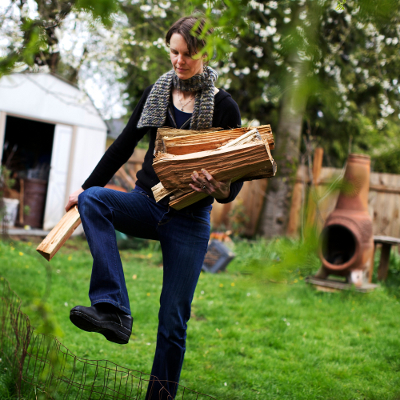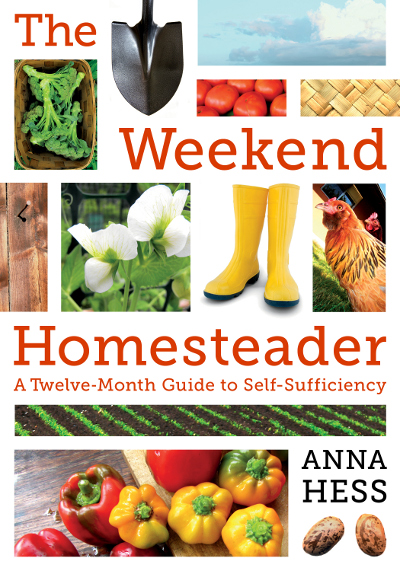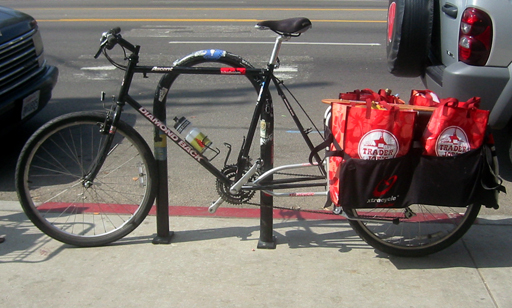
Radical homemakers live well on less
In the third selection
from Radical
Homemakers, Shannon
Hayes left the realm of theory and began to explore the similarities
she'd noticed among the radical homemakers interviewed. She
explained that radical homemakers had redefined poverty and wealth,
finding joy in free time, a strong marriage (if applicable), happy
friendships, a cohesive family, and good food rather than striving to
achieve the highest earning potential.
The chapter sought to
dispel the myth that the following facets of middle class life are
unachievable in a single- (or no-) wage-earner household:
- Transportation
- Housing
- Health care
- Child care
- Education
- Retirement
Many of the radical
homemakers' methods of achieving these goals on the cheap were
inspiring --- focusing on good food, low stress, and community bonds to
ensure your health, for example. Other methods were obvious ---
there's no need to pay for child care if at least one parent is at home
full time.
 But I was struck by how
middle class all of the assumptions (and participants) were. Many
of the radical homemakers chose to homeschool and not jump through the
expensive and time-consuming hoops required to get their kids into the
right preschool so they could get into the right private school and
then into the right college. And yet, 27% of those parents had
gone to grad or med school and 30% had a bachelor's degree (usually
listed as being from a prestigious private school), while only 3% and
6% had chosen the traditionally lower class options of the military or
a community college/technical school. (Actually, I suspect those
higher education percentages are underestimates --- anyone whose bio
didn't explicitly mention their education went into my "potentially
high school" category, but many of those people may simply have not
self-identified based on their school.) Those statistics tell me
that the majority of the participants in the study were culturally
middle class people who had access to options not available to the
average American.
But I was struck by how
middle class all of the assumptions (and participants) were. Many
of the radical homemakers chose to homeschool and not jump through the
expensive and time-consuming hoops required to get their kids into the
right preschool so they could get into the right private school and
then into the right college. And yet, 27% of those parents had
gone to grad or med school and 30% had a bachelor's degree (usually
listed as being from a prestigious private school), while only 3% and
6% had chosen the traditionally lower class options of the military or
a community college/technical school. (Actually, I suspect those
higher education percentages are underestimates --- anyone whose bio
didn't explicitly mention their education went into my "potentially
high school" category, but many of those people may simply have not
self-identified based on their school.) Those statistics tell me
that the majority of the participants in the study were culturally
middle class people who had access to options not available to the
average American.
 I could pick apart other
middle class assumptions (especially in the housing and income levels
of the radical homemakers), but I wanted to throw this week's thought
question out to my readers before you all roll your eyes and move
on. A couple of you commented on last
week's post to say
that when you're truly poor, you can't help working long hours to
support your family. With that in mind, I'm beginning to wonder
whether Radical
Homemakers really
represents a template that we can all use to live well on less, or
whether the book should be subtitled "how not to go quite as crazy as a
middle class American." We've
discussed this topic in relation to Walden previously, but
I thought it was worth rehashing with a more modern perspective.
What do you think?
I could pick apart other
middle class assumptions (especially in the housing and income levels
of the radical homemakers), but I wanted to throw this week's thought
question out to my readers before you all roll your eyes and move
on. A couple of you commented on last
week's post to say
that when you're truly poor, you can't help working long hours to
support your family. With that in mind, I'm beginning to wonder
whether Radical
Homemakers really
represents a template that we can all use to live well on less, or
whether the book should be subtitled "how not to go quite as crazy as a
middle class American." We've
discussed this topic in relation to Walden previously, but
I thought it was worth rehashing with a more modern perspective.
What do you think?
If you're still reading
along, we'll finish up the book by discussing chapters six and seven
(and the profiles if you feel so inclined) next Wednesday. Then
we'll take a week off before diving into a book that I've been itching
to savor for months --- The
Holistic Orchard by
Michael Phillips. I'm not sure how this text will do as a book
club selection since it's more factual and less philosophical than the  other ones we've been
discussing, but I have a feeling from the sections I've dipped into
that Phillips' new book will change the way we all look at fruit trees
and bushes, and I know it's one of the few books that will make the cut
and stay on my permanent bookshelf. So put in that interlibrary
loan request now and we'll start discussing chapter 1 of The
Holistic Orchard
on October 3.
other ones we've been
discussing, but I have a feeling from the sections I've dipped into
that Phillips' new book will change the way we all look at fruit trees
and bushes, and I know it's one of the few books that will make the cut
and stay on my permanent bookshelf. So put in that interlibrary
loan request now and we'll start discussing chapter 1 of The
Holistic Orchard
on October 3.
If
you want to be the first one on your block to see Walden Effect
readers' homesteading innovations in print, preorder your copy of The
Weekend Homesteader today.
